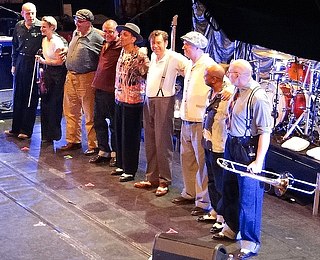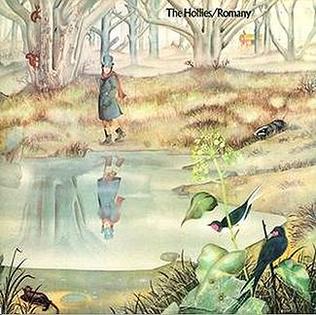The Romany Rye is an 1857 novel by George Borrow.
The Romany Rye may also refer to:
- The Romany Rye (band), an American indie band
- The Romany Rye (play), a play by George Robert Sims
The Romany Rye is an 1857 novel by George Borrow.
The Romany Rye may also refer to:
Roman or Romans most often refers to:
Romany relates or may refer to:

Dexys Midnight Runners are an English pop rock band from Birmingham, with soul influences, who achieved major commercial success in the early to mid-1980s. They are best known in the UK for their songs "Come On Eileen" and "Geno", both of which peaked at No. 1 on the UK Singles Chart, as well as six other top-20 singles. "Come On Eileen" also topped the US Billboard Hot 100, and with extensive airplay on MTV they are associated with the Second British Invasion.
Color or colour is the visual perceptual property corresponding in humans to the categories called red, yellow, blue, green, etc.

Romani music is the music of the Romani people who have their origins in northern India but today live mostly in Europe.

George Henry Borrow was an English writer of novels and of travel based on personal experiences in Europe. His travels gave him a close affinity with the Romani people of Europe, who figure strongly in his work. His best-known books are The Bible in Spain and the novels Lavengro and The Romany Rye, set in his time with the English Romanichal (Gypsies).

Romany Romanic Malco Jr. is an American actor, voice actor, rapper, and music producer. He has been nominated for several awards, including an NAACP Image Award, MTV Movie Award, and Screen Actors Guild Award. In film, he is best known for his roles in The 40 Year-Old Virgin (2005), Baby Mama (2008), Think Like a Man (2012) and its sequel Think Like a Man Too (2014), and The DUFF (2015). In television, he is best known for portraying Conrad Shepard on the Showtime series Weeds (2005–2012) and Rome Howard on the ABC series A Million Little Things (2018–present). He is also known for writing the rap lyrics for the character of MC Skat Kat in "Opposites Attract".

The Princess's Theatre or Princess Theatre was a theatre in Oxford Street, London. The building opened in 1828 as the "Queen's Bazaar" and housed a diorama by Clarkson Stanfield and David Roberts. It was converted into a theatre and opened in 1836 as the Princess's Theatre, named for then Princess Victoria before her accession as queen. After an unsuccessful series of promenade concerts, alterations were made on the interior, and the theatre was reopened on 26 December 1842 with Vincenzo Bellini's opera La sonnambula. The theatre, by now under the management of John Medex Maddox, presented operas and other entertainments, such as General Tom Thumb.
The Romany Rye is a novel by George Borrow, written in 1857 as a sequel to Lavengro (1851).

Romany is the twelfth UK studio album by The Hollies, the first not to feature their lead singer Allan Clarke, who had left to embark on a solo career. He was replaced by Swedish singer Mikael Rickfors. In the opinion of contemporary and retrospective critics, this album moved the band further away from the original vocal harmony style of Allan Clarke, Tony Hicks and Graham Nash.

Marie Marchand, known as Romany Marie, was a Greenwich Village restaurateur who played a key role in bohemianism from the early 1900s through the late 1950s in Manhattan.

Mikael Rickfors is a Swedish singer and songwriter. From 1968, he was the lead singer and bass guitarist in Swedish band Bamboo. The band released two singles before breaking up in 1970. Rickfors later performed with the British rock group The Hollies for about two years. At this period he displayed a wide vocal range and powerful chest voice. In later decades he took on a deliberate, slightly raspy tone. After his time in The Hollies, he started a somewhat successful solo career. The commercial highlight was the 1988 hit "Vingar" in Sweden.

Lavengro: The Scholar, the Gypsy, the Priest (1851) is a work by George Borrow, falling somewhere between the genres of memoir and novel, which has long been considered a classic of 19th-century English literature. According to the author, lav-engro is a Romany word meaning "word master". The historian G. M. Trevelyan called it "a book that breathes the spirit of that period of strong and eccentric characters".
The Romany Rye is a band formed by Luke MacMaster, former guitarist of The Colour. Their first album, Highway 1, Looking Back Carefully, was released on October 5, 2009 with a track listing of eight songs. The band could be categorized as indie folk-rock and draws comparisons to the likes of Neil Young, My Morning Jacket, Ryan Adams & The Cardinals, and many others. Kings of Leon guitarist Matthew Followill, whose band has its early roots in country rock, dubbed them a band to watch in 2010. On January 3, 2012, they released their second album, "Quicksilver Sunbeam".
Douglas Payne was a British actor of the silent era.

Gypsy Wildcat is a 1944 Technicolor adventure film directed by Roy William Neil starring Maria Montez, Jon Hall and Peter Coe. It was co-written by James M. Cain.

The Life Line is a 1919 American silent drama film directed by Maurice Tourneur and starring Jack Holt, Wallace Beery and Lew Cody. The picture was based on the play The Romany Rye by the British playwright George R. Sims. The film is set amongst the criminal classes in the slums of London.
The Color or The Colour may refer to:
The Romany Rye is a melodramatic play, by George R. Sims, first produced in London in 1882 at the Princess's Theatre, produced by and starring Wilson Barrett. The play was staged following the hugely successful The Lights o' London by the same author and producer. Whilst it failed to gather the same positive critical reception, and did not reach the success of the predecessor, it still ran for 138 performances in London before setting out on a regional tour.